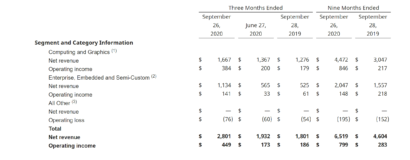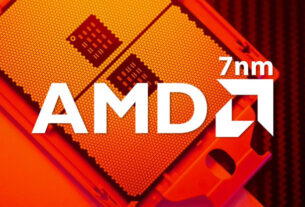
AMD (NASDAQ:AMD) has been cresting a bullish wave ever since Intel’s (NASDAQ:INTC) shock announcement of a delay in the launch of its 7nm node products. Today, the semiconductor heavyweight has come under a fresh spotlight as it announced its earnings for the third quarter of 2020.
AMD (NASDAQ: AMD) Financial Scorecard
For the three months that ended on the 30th of September 2020, AMD earned $2.8 billion in revenue, registering an annual increase of 55.6 percent and beating consensus expectations by 9.38 percent.
<!—->
(All figures are in billions of dollars)
The following snippet from AMD’s press release gives a granular breakdown of the company’s revenue streams:

As is evident from the snippet above, Computing and Graphics segment led the pack with $1.67 billion in revenue, corresponding to an increase of 30.64 percent relative to the comparable quarter of 2019. This was driven by a significant increase in AMD’s Ryzen processor sales which were partially offset by lower graphics revenue.
Similarly, Enterprise, Embedded and Semi-Custom segment – which primarily includes AMD’s server and embedded processors, semi-custom System-on-Chip (SoC) products, development services and technology for game consoles – generated a revenue of $1.13 billion, translating to annual growth of 116 percent. This growth was primarily driven by higher semi-custom product sales and increased EPYC processor sales.
AMD also reported $1.77 billion in cash and cash equivalents at the end of Q3 2020.
<!—->
(All figures are in billions of dollars)
Finally, AMD reported a GAAP EPS of $0.32, beating consensus expectations by $0.02.
<!—->
(All figures are in billions of dollars)
Other key highlights from AMD’s earnings release include:
- Introduced the AMD Ryzen 5000 Series desktop processors, extending AMD leadership across gaming, single-threaded, and multi-threaded performance as well as power efficiency. Powered by the new “Zen 3” core architecture, the new processors deliver a 19 percent generational increase in instructions per cycle (IPC), the largest since the introduction of “Zen” processors in 2017.
- EPYC processors are now being used by the Azure Data Explorer data analytics platform to improve real-time analysis on large volumes of data streaming from applications, websites, IoT devices and more.
- Oracle announced plans to offer cloud instances based on next-generation EPYC processors, codenamed “Milan.”
- Cloud service providers continued to announce the availability of new instances based on EPYC processors, including AWS C5ad instances for compute-intensive workloads, Google Cloud Confidential VMs featuring AMD Secure Encrypted Virtualization, and Microsoft Azure VMs which use EPYC processors to power Office 365 applications.
- Announced growing ecosystem support for virtualization solutions based on VMware® and Nutanix™ software from Dell, HPE and Lenovo.
- VMware announced support for AMD Secure Encrypted Virtualization – Encrypted State technology in its latest version of vSphere®.
- Northern Data is leveraging EPYC and Radeon Instinct™ processors for one of the world’s largest GPU-based distributed computing clusters for HPC applications at sites across Norway, Sweden and Canada.
- OEM partners continued to launch new AMD-powered notebooks, desktops and Chromebooks, including new HP and Lenovo notebooks and desktops for the commercial, consumer and gaming markets and the first “Zen”-based Chromebooks.
- AMD announced new Ryzen 4000 Series Desktop Processors with Radeon Graphics and Athlon™ 3000 Series Desktop Processors with Radeon Graphics for the consumer market, as well as the new Ryzen PRO 4000 Series and Athlon PRO 3000 Series Desktop Processors for the commercial market.
- AMD and Apple announced the availability of new Radeon Pro 5000 series GPUs for the updated 27-inch iMac, bringing compute performance, energy efficiency and features to a wide variety of graphically intensive applications and workloads.
As far as projections are concerned, AMD expects to earn $3 billion (+/- $100 million) in revenue during the fourth quarter of 2020. The growth in the top-line metric is expected to be primarily driven by the ramp of new Ryzen, EPYC and semi-custom products and growing customer momentum. AMD expects non-GAAP gross margin to be approximately 45 percent in the fourth quarter of 2020. For the entire FY 2020, AMD now expects its revenue to grow by 41 percent relative to FY 2019, up from prior guidance of 32 percent.

Source
AMD shares are currently modestly down in pre-market trading. Of course, the acquisition of Xilinx, to be financed entirely through equity, may be playing an important role in depressing the stock price.



